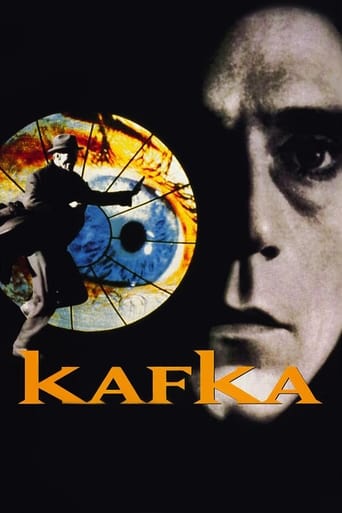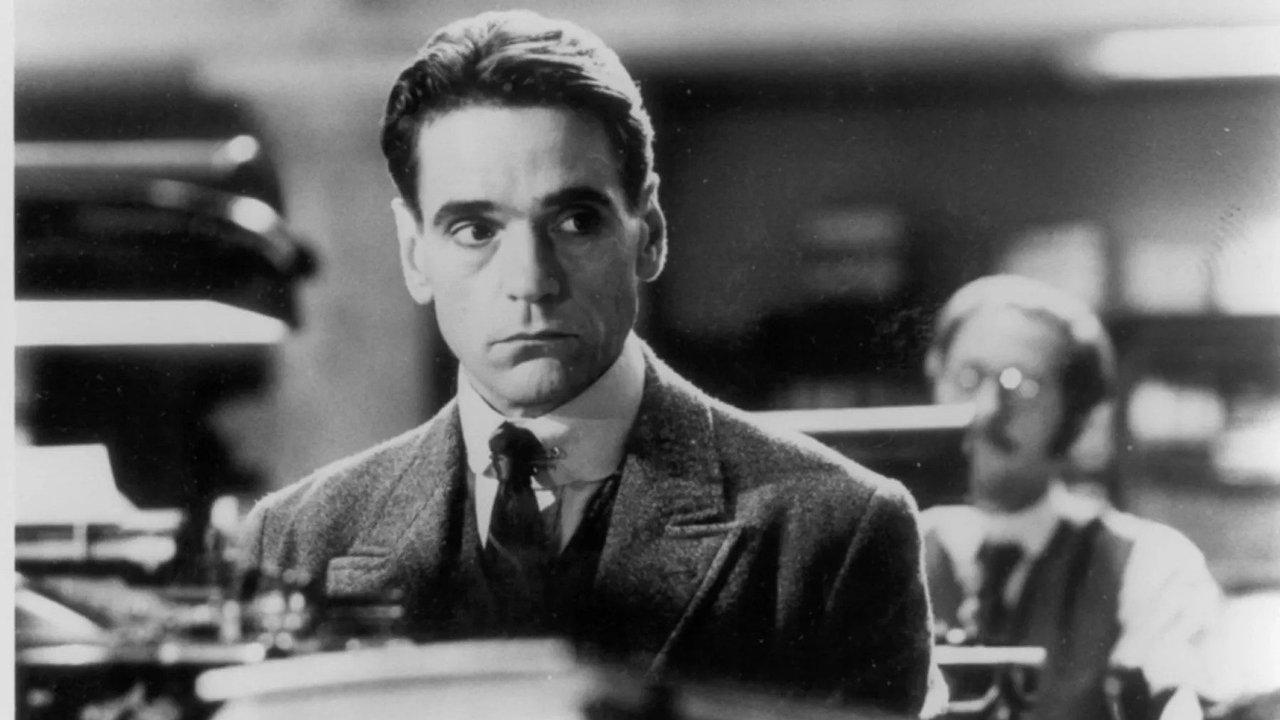gavin6942
Writer Franz Kafka (Jeremy Irons) works during the day at an insurance company where events lead him to discover a mysterious underground society with strange suppression goals.I was not aware of this film until now (2016), and boy was I missing out. What a great blend of Kafka's real life and his world of literature that had a strong disdain for bureaucracy. At some points I was not sure where Kafka's real life ended and the illusion began. (Presumably most is fiction, but enough truth seeps through.) This film also had an excellent use of color. Most of the film, in fact, has no color at all. And when that can be done effectively, as it is here, it has a certain power that color never can. And then when the scenes have color, it means so much more than if it was there in every frame.
Graham Greene
This is a somewhat curious film, attempting to be old-fashioned - in the sense that we have varying strands from an early-twentieth century writer, as well as setting, production design and various visual iconography - yet at the same time striving for a sense of post-modernist reinvention. So, what we end up with is a stunning, self-referential combination of the 'look' (which mixes elements of Carol Reed's The Third Man and Welles' Citizen Kane), with elements of the steam-punk sub-genre of films like Eraserhead, Brazil, Tetsuo: The Iron Man, Barton Fink, etc . The story also concerns itself with the notions of the film-noir, both in terms of characterisation, narrative tension and visual design.So, with Kafka (1991), we not only have the externally referential - of Kafka writing a story, whilst simultaneously involving himself in a real-life plot that will, in turn, become the story he is writing (The Castle) - but also the internal references to Kafka's own biographical history; from his job at the insurance company, to the difficult relationship with his father, and also his failed love affair etc. In the lead role we have one of Britain's most competent actors, Jeremy Irons, who, although never looking exactly like Kafka, does at least manage to embody the quiet, stubborn, meticulous spirit of the writer (or, at least the image that we have of him). His performance is one of complete restraint, far removed from some of his more caricatured performances of recent years, as he offers up a mirrored perspective for the audience; lingering in the background of the scene and simply reacting to what is going on around him (again, a popular device from Kafka's work).Director Steven Soderbergh compliments and visualises the screenplay by Lem Dobbs exceptionally well, drawing on the aforementioned influences in a similar, post-modernistic way to their subsequent 1999 collaboration, The Limey. Soderbergh also offers us a depiction of a crumbling Europe thrown into confusion, creating a fully functioning world, much like Ridley Scott did with Blade Runner - offering us an illustration of the past by way of the future - or a depiction of Europe in decline to rival that of Fassbinder's The Marriage of Maria Braun (1979), von Trier's Europa (1991) and Soderbergh own subsequent film, The Good German (2006). So, whereas most films are content to create, or in this case recreate, early-twentieth century iconography in which the past is as pristine and shockingly brand-new, as if it were created only a yesterday, here we get a past that is dirty, grimy, filled with smoke, fog and dust; in short... totally believable.This is a film the people expect too much coherency from; something that Soderbergh's continual mainstream success has only damaged further. As more and more cinema-goers come to adore films like Oceans 11 (2000), Traffic (2001) and Solaris (2002), they come to Kafka expecting a mainstream Hollywood thriller. Kafka couldn't be further from this. Here is an intelligent film that draws on the audience's understanding of European cinema and, to some extent, Kafka's own literary back-catalogue in order to piece together the film's central mystery. The main reference point is Kafka's book The Castle; here featured as an imposing fortress atop a shadowy hill. Inside, Kafka finds Ian Holm's mad scientist and the film switches to glorious Technicolor. There are also allusions made to The Trail, with Armin Mueller-Stahl's detective doggedly questioning Kafka's whereabouts and the integrity of his 'story' (an important factor within the film's internal struggle), as well as a direct reference to The Metamorphosis and some of the writer's more abstract shorter pieces.Soderbergh and Dobbs aren't concerned with pandering to anyone here; they allow the story to remain, much like Kafka himself, an enigma. The story grips us like film-noir should, and Soderbergh keeps us enthralled with his constantly inventive camera work. This is a perfect film that deals with notions of fact and fiction, dreams and reality. The filmmakers respect our intelligence; they understand that some question can remain unanswered and film can work better as a result of this. Whether or not you believe the story to have taken place entirely in Kafka's head (note how the last shot of the film sees Kafka at his writing desk) or whether you see it as the mirroring of fact and fiction is entirely up to you. With fine support from Theresa Russell, Jeroen Krabbé and Alec Guinness, coupled with an exotic Cliff Martinez score, what we have with Kafka is one of the best and most underrated films of the nineteen nineties. A unique experience.
avrilwibert
I just like Prague, what a beautiful place to photograph, how many deeply associative, almost mythical, images does one come across in Prague, castles and winding rivers and bridges and gargoyles and cobblestone squares and narrow alleys with walkway overpasses and dark old European colours. Plus I love Kafka, and anyone who holds a deep respect for Kafka will take pleasure in imagining his what his real life experiences may have been like if his real life experiences had included events analogous to those that take place in The Castle, which I have never read actually, but I think the events of the movie are taken from the events in that story. Anyway, though, Prague is beautiful and so is Kafka's writing. I've been to the Jewish quarter of Prague, Kafka's birth place, and the Jewish cemeteryit's otherworldly and the real life city now has the kind of romance in it that we usually find only in movies and novels and paintings and other forms of imaginingso, it's a wonderful place to shoot a movie.
Space_Mafune
Early Steven Soderbergh film is full of grand ideas and thoughtful reflection combined with fear and doubt of the world at large. A nice mix when attempting to portray a writer. This film owes elements to NOSFERATU(1922) and even makes frequent references to Murnau and Orlac, DRACULA(1931), FRANKENSTEIN(1931), BRAZIL & NINETEEN EIGHTY-FOUR(1984). However, it's not quite in the same league as those. The film is a bit too predictable. Excellent performance by Jeremy irons in the lead.


 AD
AD



